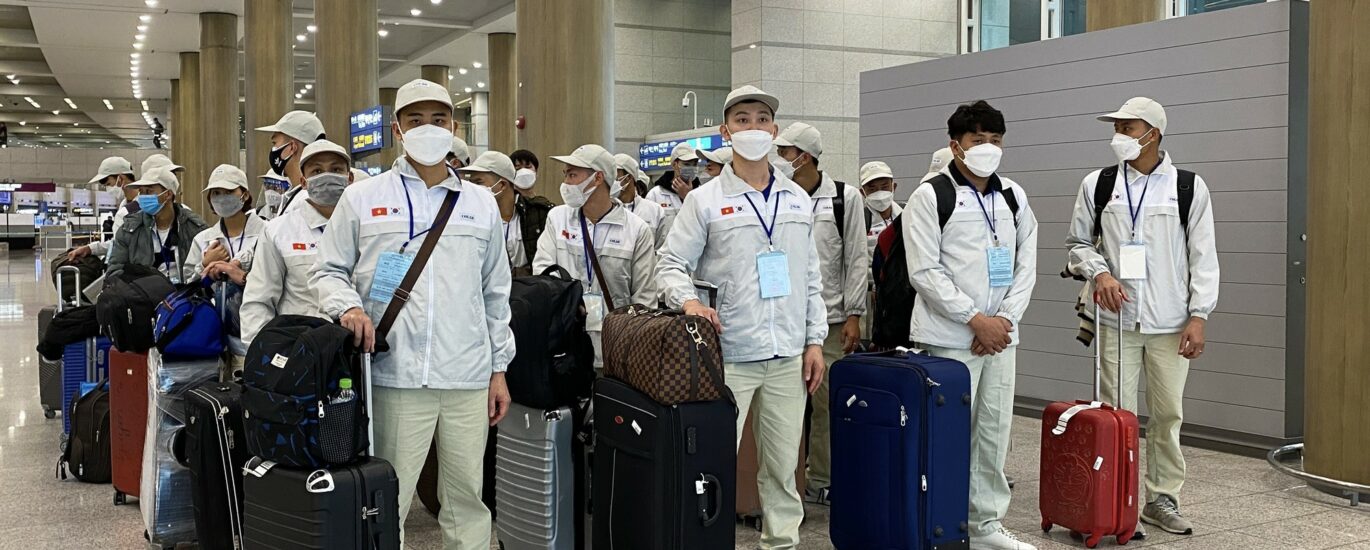In subparagraph (d) of Article 3 of the Law No. 4904, which defines the duties of the Turkish Employment Agency, it is clearly stipulated with the provision “….. to mediate in the placement of the labour force … in the jobs they are suitable for abroad and in finding suitable labour force for various jobs and in concluding service contracts abroad, ….. to carry out transactions related to the employers’ procurement of Turkish workers to be employed abroad in their own business and activities…”.
Again, the statement at the end of the first paragraph of Article 17 of the Law, which allows the establishment of private employment agencies, that “it is obligatory to have the service contracts abroad approved by the institution” and the fact that there is no special prohibition on this issue reveals that private employment agencies are also authorized to send labour abroad.
On the other hand, it is stated that since the institutions and bureaus are authorised and other persons and institutions are not authorised, this issue, which is essentially prohibited, is valid if a employment contract is to be established, and that there is no such prohibition in intermediation for the establishment of a work contract, for example. The provisions of the “Regulation on overseas employment services” should also be addressed in this regard.
Article 4 of the Regulation, which has the title of labour supply, underlines that institutions and bureaus are authorised to intermediate in the supply of labour by companies wishing to employ Turkish workers in a foreign country or in the dispatch of those who wish to work as workers abroad, and it is made possible for companies to procure the workers to be employed in their own business and activities abroad from the records of the institution or through private employment offices, or if they procure workers themselves, they can be taken abroad by having the service contracts made approved by the institution.
The term “company” here should be understood as the company working abroad, as clearly regulated in the article. Additionally, according to the provision of the article, the Turkish workers supplied by these companies shall only be employed in these jobs or activities abroad. Therefore, it is forbidden for a company to provide labour for a work that is not its own work or to use the labour provided by the company for other works and activities abroad. Additionally, it should be noted immediately that a company’s supplying labour for its own business is not a business intermediation activity. Again, it is not necessary for this company to be a Turkish company. As a matter of fact, the fact that there is no special regulation on this issue and that the documents to be submitted are listed in Article 5 of the regulation, and the special conditions of these documents for foreign companies are also stated separately makes it easier to understand. In this case, it is possible for a foreign company to procure workers from Turkey and take them to Turkey to work in these jobs or for an institution or a private employment agency to procure workers in Turkey for a foreign company.
It is clear that the concept of service contract mentioned here should be understood as the employment contracts made in accordance with the Labour Law No. 4857. Additionally, these contracts are prepared by the institution in the form of a form, taking into account the basic issues in labour law. Again, Article 9 of the regulation includes a special regulation, making it possible to make a single service contract between the employer and a worker representing all Turkish workers for temporary workers who will go abroad within the scope of the communiqué on temporary workers who will work in Saudi Arabia during the hajj period in line with the decision of the Inter-ministerial Hajj and Umrah Board. However, the regulation stated herein creates an arrangement, a type of employment contract that cannot be included in the Labour Law No. 4857. Even though it is a special regulation, it is clear that the provision of the communiqué is contrary to the Labour Law, since a special regulation cannot be made with the communiqué provision according to the law. The closest arrangement to the described arrangement is the team contracts as regulated in Article 16 of the Labour Law, and even in this case, the contract made in the capacity of team guide is a separate contract (team contract) and separate employment contracts are established between each worker and the employer with the work of each worker whose name is written in the contract.
The procedures to be carried out in terms of taking Turkish workers abroad are regulated in terms of the company that will take the worker and the private employment agency. Accordingly, the company that will employ workers in its own business and activity or the private employment agency that provides intermediary services in this direction must first provide some information and documents to the institution and in any case, they must have the employment contracts prepared in this direction approved by the institution according to Article 8 of the regulation. Additionally, Article 6 of the Regulation provides for an announcement institution, and it is stipulated that the institution will give permission to the company that wants to provide labour for its own business and activity through an announcement, and in the announcement, it is stated which unit of the institution the permission is obtained from and the date and number of the permission given. It is stated in Article 7, Paragraph 3 of the Regulation that an announcement in the same direction is not required for a private employment agency. Additionally, as per Article 7, Paragraph 2 of the Regulation, the private employment agency is obliged to keep one copy of the employment contracts signed by the parties and approved by the institution and to give one copy to the employee and the institution.
The documents and information that must be submitted to the institution are listed in Article 5 of the regulation, jointly for both companies and private employment agencies. Accordingly, the companies that will employ workers in their jobs abroad;
- A copy of the trade registry gazette for Turkish companies, a copy of the document regarding the establishment of foreign companies certified by the competent authority or a Turkish translation made by sworn translation offices,
- For contracting works, a letter or work receipt document to be obtained from the competent unit in the country where the work is taken or from the competent public institution in our country, for works other than contracting works, a letter or appropriate opinion documents to be obtained from the competent unit indicating the number of workers to be employed in the workplace,
- Overseas contracting certificate or overseas temporary contracting certificate obtained from the Ministry of Environment and Urbanisation,
- For Turkish companies, a document indicating that the social security of the Turkish workers is provided in accordance with the provisions of the social security legislation in force in Turkey,
- In cases where the transactions will be made through a proxy, the original or a copy of the power of attorney or authorisation document to be approved by the institution after seeing the original,
- For the Turkish workers to be taken abroad by Turkish companies within the scope of the primary employer-subcontractor relationship, the petition of the primary employer who has taken the work and the subcontracting agreement shall be submitted to the provincial organisation units of the institution. According to Article 3 of the regulation, the relevant provincial / service centre directorates of the Turkish Employment Agency should be understood from the concept of provincial organisation here.
When the provisions of the law and the regulation are evaluated, it is seen that violations of the principles regarding overseas job placement services are subject to legal and criminal sanctions.
Legal sanctions are gathered especially within the framework of the institution’s approval of employment contracts and private employment agency activities. According to Article 18 of the Law No. 4904, if the conditions for the renewal of the activity permit issued according to Article 17 of the law, including the issues related to abroad within the activities of a private employment agency, are not fulfilled, the renewal request requires the rejection of the renewal request. Additionally, if the private employment agency has not placed a job within 18 months from the date of issuance or renewal of the permit, or it has been determined that the conditions for granting or renewing the permit have not been met or have been lost, or it has been determined that the conditions for granting or renewing the permit have not been met, or the information collection and jobseeker information collection regulated in Article 19. If the principles of collecting information and not obtaining benefits from job seekers regulated in Article 19 are continued despite the written warning by the institution, or if the agreements specified in subparagraphs a, b and c of the third paragraph of Article 19 are made, or if the acts regulated in subparagraphs a, b, c, f, g and j of Article 20, which require administrative fines, are committed for the third time, the activity permit issued is cancelled. Again, as a legal sanction, the inability to approve employment contracts or to accept labour transfer requests is included in the regulation. Failure to approve the employment contracts and refusal to accept the requests should be perceived as a legal sanction since it directly prevents the realisation of the foreseen purpose.
Accordingly, according to subparagraph 2 of Article 11 of the regulation, when there are documents from official authorities indicating that the workers taken abroad for employment are victimized or that benefits are obtained from the workers for the purpose of taking them abroad, the employment contracts will not be approved by the institution unless the employers prove that there is no such victimisation or benefit procurement, and according to subparagraph 3 of the same article, the requests of real or legal persons or their proxies who have been sentenced by court decision for labour brokerage or similar reasons will not be accepted. In this respect, it will not be possible for persons who have been sentenced for labour brokerage or similar reasons to carry out activities in this direction, even if these sentences have been postponed, even if they are Penalties, or even if the sentence has been executed and the person is free, since there is no special regulation on this issue. Additionally, according to the provision of the article, the term “person” should be understood as real persons or proxies representing legal entities. Again, even if the proxy has not been sentenced for such an offense, if he/she is acting as a proxy for a natural or legal person who has been convicted of this offense, this request will be rejected.
Criminal sanctions are foreseen as administrative Penalties. As explained above, these penalties arise from Article 20 of the Law No. 4904 in accordance with the references made.
A problem that arises in the context of the employment of workers taken from Turkey for a job abroad is the problem of antagonism regarding labour receivables. Here, a problem arises in the context of determining the responsibility of the Turkish company for the receivables of Turkish workers employed by Turkish nationals through companies established by them with foreign citizens or companies. At this point, if it is understood that the partnership of the foreigner is not a real partnership, but only the fullfillment of a mere formality in order to do business in that country, this situation will be accepted as hiding behind the veil of legal personality against labour receivables, in other words, abuse of the right of legal personality, and the liability of the Turkish company will be in question.





